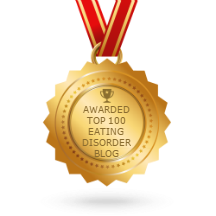- Home
- About
-
Services
- Therapy
-
Eating Disorder Trainings
>
- Clinical Approaches To Treating Body Image Issues
- Clinical Approaches To Treating Bulimia & Binge Eating Disorder
- Finding Freedom From Binge Eating
- Finding Freedom From Anorexia
- Supporting A Loved One With An Eating Disorder
- Eating Disorder Recovery Road Map
- Healing From Body Hate And Practicing Self-Compassion
- Common Questions
- Blog
- Press
- Contact
|
She is running. Sweat is dripping down her face. Her eyes lingering on the numbers lit up on the treadmill. Pain is shooting through her leg. She thinks that she might have strained or pulled something last week. Yet, the thought of missing a day at the gym fills her with anxiety and fear. She can’t remember the last time that she took a day off. Her friends praise her for her dedication and “fitness.” They say that they wish they could be as disciplined. But it is not discipline that causes her to run for miles every morning. There is a voice in her head, which demands that she keep running. She is not choosing to feel and behave this way. She is a prisoner to her own mind. The media and society frequently pronounces the health benefits of regular exercise. However, for individuals who are struggling with compulsive exercise, this can become physically and mentally unhealthy. As a therapist in private practice in Rockville, Maryland, specializing in helping people struggling with eating disorders and compulsive exercise, the following are three of my tips for breaking free from compulsive exercise, and getting your life back. 1. Cultivate an awareness of your thoughts and behaviors surrounding exercise. The first step is to identify aspects of your relationship to exercise that are problematic. For instance, notice the thoughts and stories that you are telling yourself surrounding exercise. For example, do you tell yourself that “a workout does not count unless I sweat?” Or maybe, you exercise to compensate for eating. These are examples of some unhealthy ways to view movement. Additionally, it’s important to look at whether you are struggling with any of these other warning signs that your relationship to exercise could be unhealthy:
You can take this compulsive exercise self-assessment to further evaluate your relationship to exercise. Additionally, it can be helpful to come up with some "healthy self" coping statements that you can put in your phone. An example might be, "I deserve to eat and nourish my body, no matter how much I have exercised today" or "The amount that I exercise, does not define my worth as a person." 2. Work to challenge any exercise “rules.” You can also make a list of any exercise “rules” that you feel that you must follow. For example, “I always exercise for ___ amount of time,” or “I only take one rest day per week,” or “I must sweat when I exercise.” Then, gradually work to challenge these rules, in small and manageable steps. For instance, you might start by taking one rest day a week or trying a gentle yoga class instead of running. Or you might begin by shaving off 10 minutes of your daily exercise routine. It’s important to note that when you are breaking “exercise rules” you may feel intense discomfort or distress. However, it’s important to remind yourself that this distress is only temporary. The more that you can challenge any exercise rules, the easier this will become over time. Ultimately, the eventual goal is to learn how to find forms of movement, which you can actually enjoy-as well as to be able to find variety, flexibility, and balance. 3. Come up with a list of other coping strategies. A question that I might ask a client struggling with compulsive exercise, is “When you think about exercising, what emotion are you looking to feel?” Then, we can look at some other coping strategies that the individual can use to try to get that feeling. For instance, if someone wants to feel “calm” we could explore other ways that they could feel a sense of calm such as meditation, coloring, journaling, getting a massage, or taking to a friend. Sometimes using movement to relieve anxiety makes sense, however the problem occurs when this is someone’s primary way to cope with their emotions. Thus, it’s important for people to have a variety of both processing and distraction coping strategies that they can use. I might also ask someone what else is bothering them that they are trying to distract themselves or “numb out from” through exercise. Then, we can actually address this issue-rather than putting a temporary “band aid” on a gaping wound. The Bottom Line In a society where everyone is loudly proclaiming the health benefits of exercise, breaking free from exercise compulsion can be tough. However, it’s important to note that rest and gentler forms of movement sometimes are the healthiest choice. Especially, for those who are in recovery from an eating disorder or exercise compulsion, sometimes the healthiest thing for them to do is take a period of time off from exercise or to engage in gentler forms of movement. You are not lazy for taking time off from exercise, you are actually taking good care of yourself. Additionally, rest is a crucial component of any exercise routine (for both mental and physical health reasons), as exercise ultimately is a stressor for your body. If you are struggling with an eating disorder and/or exercise compulsion, it’s so important to reach out for help from a trained professional who specializes in this area. Often people who are struggling find that their worlds become very small and their relationships suffer. When you look back on your life at age 80 do you really think that you will be fondly reminiscing about the years spent on the treadmill, or obsessing about your body shape and weight? No. You deserve to have a meaningful and joyful life. One that you cannot have if you stay trapped in an exercise compulsion. However, with access to treatment and support full recovery from eating disorders and compulsive exercise is possible! Jennifer Rollin, MSW, LCSW-C: is an eating disorder therapist in private practice in Rockville, Maryland. Jennifer specializes in helping adolescents and adults struggling with anorexia, binge eating disorder, and bulimia, body image issues, and compulsive exercise. Jennifer offers eating disorder therapy in Rockville, Maryland, and eating disorder recovery coaching via phone/Skype. Eating Disorder Therapy easily accessible to people in Potomac, Bethesda, Germantown, Olney, Silver Spring, Maryland, and Washington D.C.
1 Comment
Judy Padmore
4/24/2020 11:09:29 pm
My daughter is on recovery from an eating disorder,has now turned 18 and extremely worried because having to walk daily
Reply
Leave a Reply. |
About MeI'm an eating disorder therapist in private practice in Rockville, MD. Archives
June 2024
|


 RSS Feed
RSS Feed
